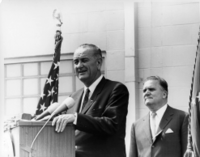United States v. Winans facts for kids
Quick facts for kids United States v. Winans |
|
|---|---|

|
|
| Argued April 3–4, 1905 Decided May 15, 1905 |
|
| Full case name | United States v. Winans |
| Citations | 198 U.S. 371 (more)
25 S. Ct. 662; 49 L. Ed. 1089; 1905 U.S. LEXIS 1110
|
| Prior history | 73 F. 72 (C.C.D. Wash. 1896) |
| Holding | |
| Treaty includes the Indians' individual right to fishing, hunting and other privileges. | |
| Court membership | |
| Case opinions | |
| Majority | McKenna, joined by Fuller, Harlan, Brewer, Brown, Peckham, Holmes, Day |
| Dissent | White |
| Laws applied | |
| U.S. Const. art. II § 2 cl. 2 (The Treaty Clause) | |
United States v. Winans, 198 U.S. 371 (1905), was a U.S. Supreme Court case that held that the Treaty with the Yakima of 1855, negotiated and signed at the Walla Walla Council of 1855, as well as treaties similar to it, protected the Indians' rights to fishing, hunting and other privileges.
Self-determination era
In March 1966, Lyndon B. Johnson made a speech before the United States Senate in which he proposed a new era in regards to the nation's relationship with Native Americans. President Johnson asserted "a new goal for our Indian programs; a goal that ends the old debate about termination of Indian programs and stresses self-determination; a goal that erases old attitudes of paternalism and promotes partnership and self-help".

All content from Kiddle encyclopedia articles (including the article images and facts) can be freely used under Attribution-ShareAlike license, unless stated otherwise. Cite this article:
United States v. Winans Facts for Kids. Kiddle Encyclopedia.

